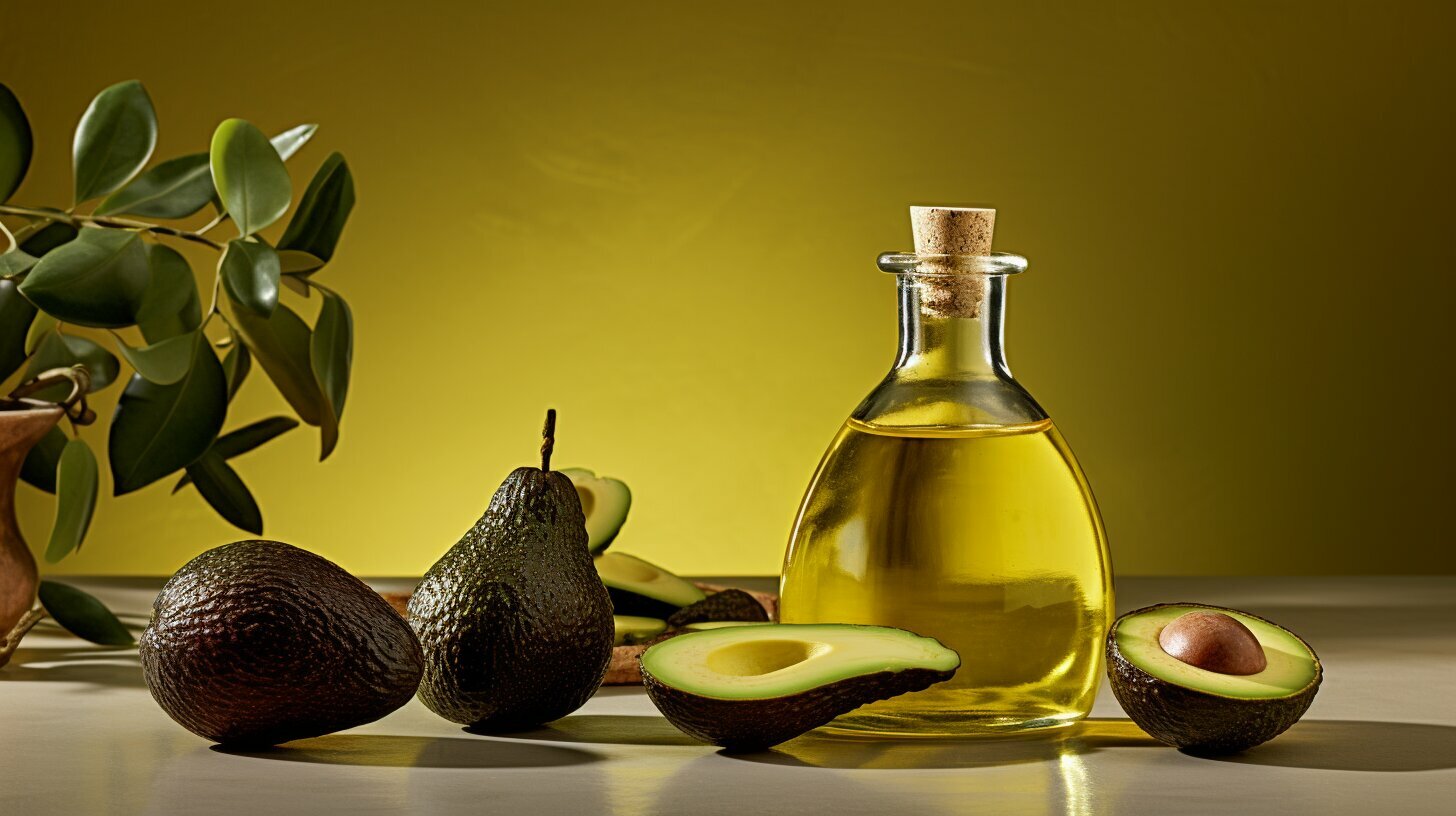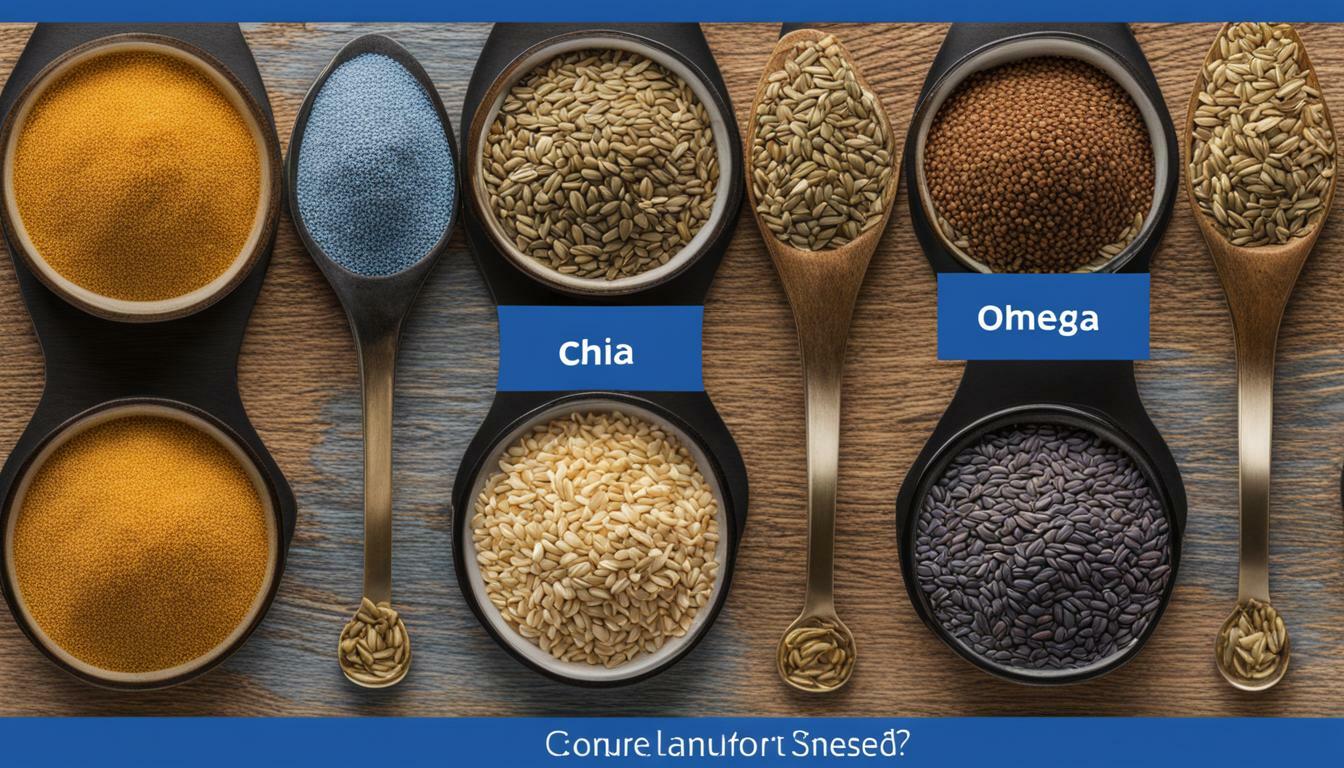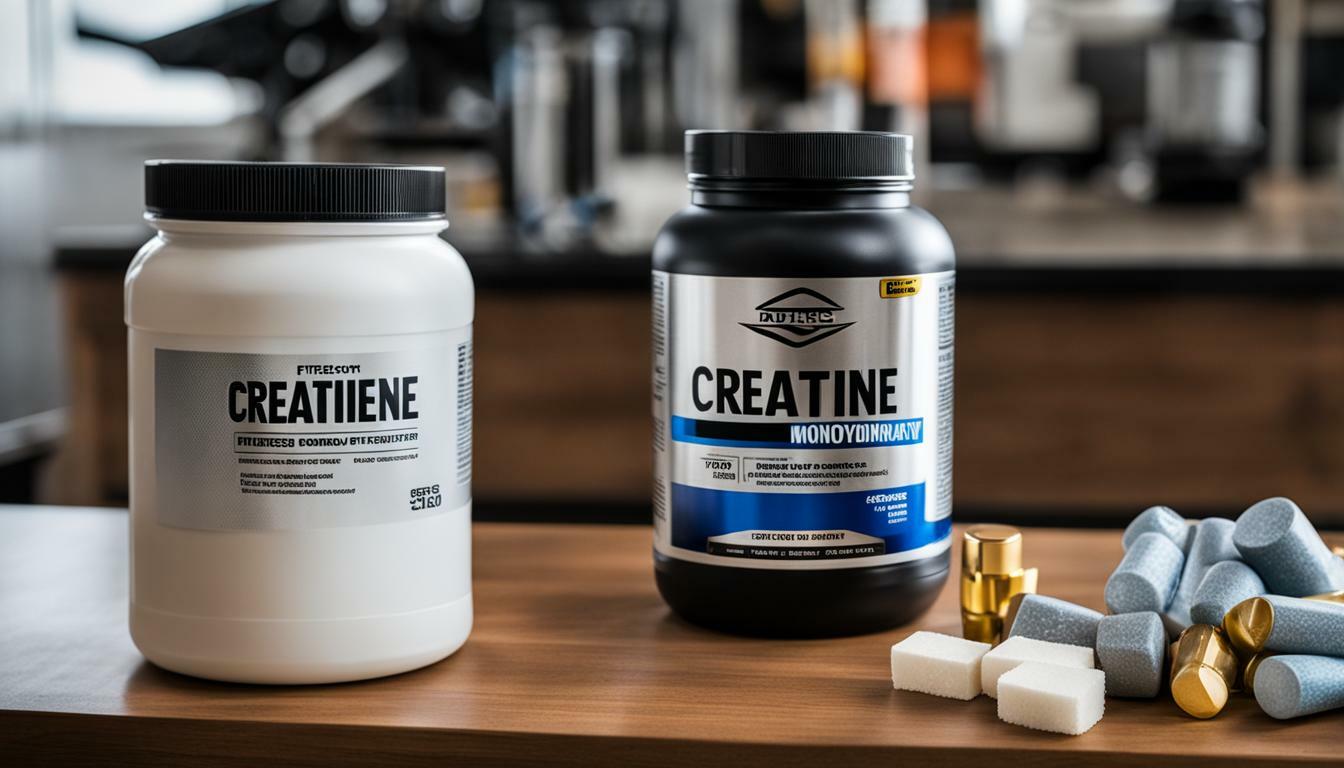Are you confused about the difference between olive oil and avocado oil? Both oils are known for their health benefits, but they have distinct qualities that make them unique. In this article, we will explore the key differences between olive oil and avocado oil, their health benefits, and their various uses in cooking.
Key Takeaways:
- Olive oil and avocado oil offer different benefits and uses.
- Olive oil is more nutritious and has a mild, versatile flavor.
- Avocado oil has a higher smoke point and a neutral taste.
- Both oils are high in unsaturated fats and antioxidants.
- They can be used interchangeably in cooking, depending on the desired flavor and cooking method.
Nutritional Comparison: Olive Oil vs. Avocado Oil
Olive oil and avocado oil are both considered healthy fats and offer a range of nutritional benefits. Let’s take a closer look at the nutritional profile of each oil to understand their similarities and differences.
When it comes to overall nutrition, olive oil takes the lead. It contains higher amounts of potassium, calcium, iron, and vitamins compared to avocado oil. These nutrients play vital roles in maintaining healthy bodily functions.
| Nutrients | Olive Oil (per 100g) | Avocado Oil (per 100g) |
|---|---|---|
| Calories | 884 | 884 |
| Total Fat | 100g | 100g |
| Monounsaturated Fat | 73g | 70g |
| Potassium | 1mg | 1mg |
| Calcium | 1mg | 0mg |
| Iron | 1mg | 1mg |
| Vitamin E | 14mg | 2mg |
While both oils are high in monounsaturated fats, which are beneficial for heart health, olive oil contains slightly more. These healthy fats help reduce LDL cholesterol levels, lower blood pressure, and decrease the risk of heart disease.
One notable difference between the two oils is their vitamin E content. Olive oil contains significantly more vitamin E compared to avocado oil. Vitamin E is an antioxidant that protects the body’s cells from damage caused by free radicals.
It’s important to note that both olive oil and avocado oil offer health benefits and can be part of a balanced diet. The choice between the two ultimately depends on personal preference, taste, and cooking needs.
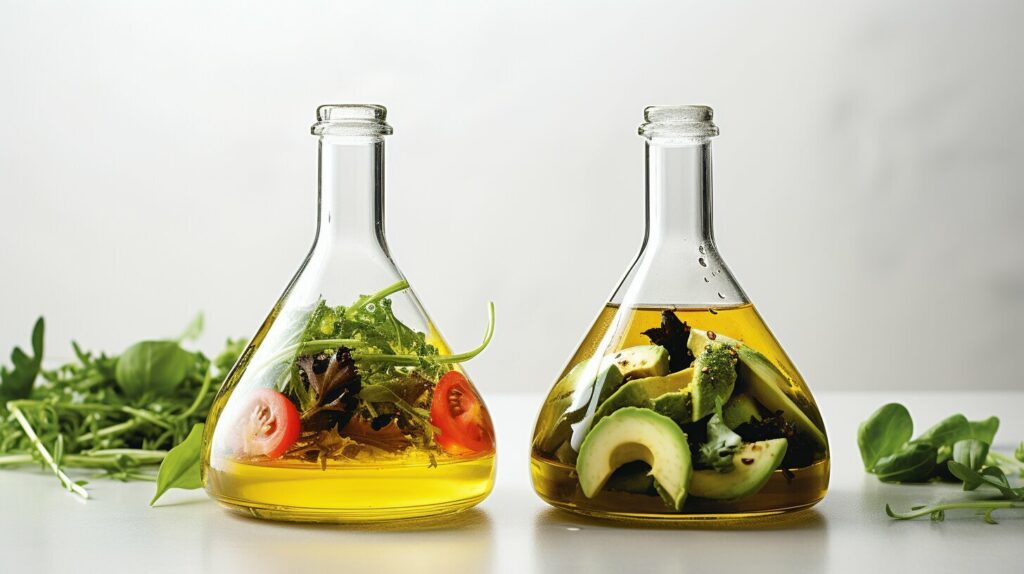
Additional Notes:
- Olive oil and avocado oil have similar calorie content, with 884 calories per 100g.
- Both oils contain 100g of total fat per 100g, making them calorie-rich.
- Avocado oil contains slightly less monounsaturated fat compared to olive oil, with 70g per 100g.
- Olive oil is a good source of potassium, calcium, and iron.
- Vitamin E is present in higher amounts in olive oil (14mg per 100g) than avocado oil (2mg per 100g).
Taste and Flavor Profile: Olive Oil vs. Avocado Oil
When it comes to taste and flavor, olive oil and avocado oil offer distinct profiles that can enhance your culinary creations. Olive oil is known for its smooth, versatile flavor that pairs well with a wide variety of dishes. It has a fresh, nutty undertone that adds a pleasant depth of flavor to salads, marinades, and dressings. The mild taste of olive oil allows it to complement both delicate and bold flavors, making it a versatile choice for cooking.
On the other hand, avocado oil has a unique flavor profile with a hint of grassiness and a mildly sweet avocado taste. The flavor of avocado oil may not be suitable for all dishes, but it can work exceptionally well with dishes that benefit from its natural taste. If you’re looking for an oil that adds a subtle avocado essence to your food, avocado oil can provide a distinct flavor experience.
The key differences in taste and flavor profile:
- Olive oil: Smooth, versatile, mild, fresh, nutty
- Avocado oil: Grassy, mildly sweet, subtle avocado flavor
“The mild taste of olive oil allows it to complement both delicate and bold flavors, making it a versatile choice for cooking.”
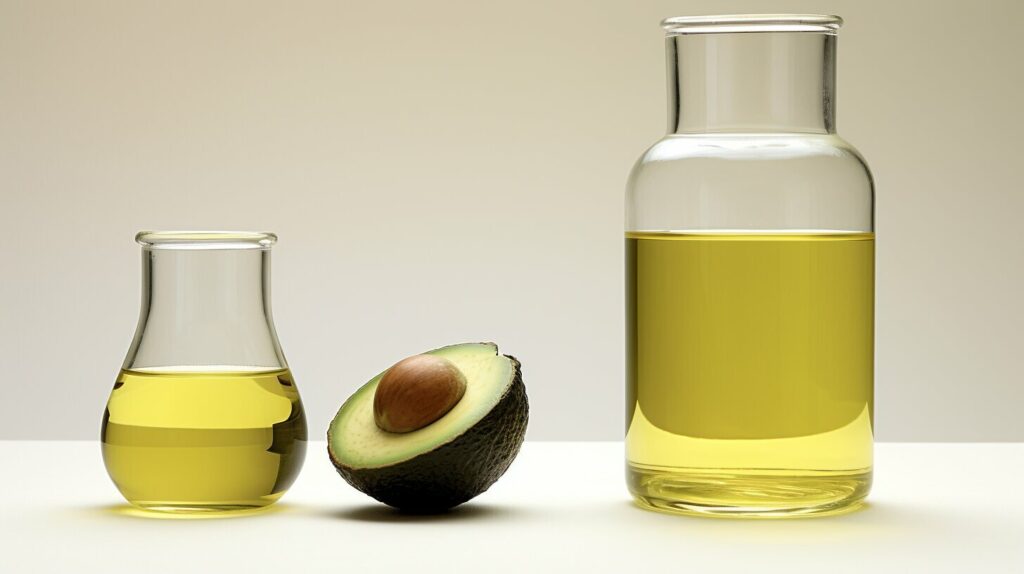
Table: Taste and Flavor Profile
| Olive Oil | Avocado Oil | |
|---|---|---|
| Flavor Profile | Smooth, versatile, mild, fresh, nutty | Grassy, mildly sweet, subtle avocado flavor |
With their unique tastes, both olive oil and avocado oil offer different dimensions to your culinary creations. Whether you prefer the familiar and versatile flavor of olive oil or the distinctive taste of avocado oil, both oils can elevate your dishes and add a delightful touch to your meals.
Cooking Uses: Olive Oil vs. Avocado Oil
Both olive oil and avocado oil are versatile ingredients that can be used in various cooking methods to enhance the flavor and texture of dishes. Understanding their unique characteristics and optimal cooking uses can help in making the best choice for different culinary needs. Here’s a comparison of the cooking uses of olive oil and avocado oil:
1. Olive Oil:
Olive oil is widely known for its mild flavor and smooth texture, making it a popular choice for a wide range of recipes. Its delicate taste doesn’t overpower the ingredients, allowing their flavors to shine. Here are some common cooking uses for olive oil:
- Sautéing and stir-frying vegetables: Olive oil adds a subtle richness to the vegetables while preserving their natural flavors.
- Dressing salads: Olive oil can be combined with vinegar or lemon juice to create simple yet delicious dressings.
- Marinating meats and seafood: The mild flavor of olive oil helps in tenderizing the meat and infusing it with subtle flavors.
- Drizzling over roasted vegetables: Olive oil adds a layer of richness and enhances the caramelization process.
2. Avocado Oil:
Avocado oil is valued for its high smoke point and neutral taste, making it ideal for cooking at higher temperatures. Its versatility and ability to withstand heat without breaking down make it suitable for various cooking techniques. Here’s how avocado oil can be used in the kitchen:
- High-heat cooking: Avocado oil’s high smoke point makes it suitable for frying, searing, and grilling.
- Baking: Avocado oil can be used as a healthier substitute for butter or vegetable oil in baking recipes.
- Sauces and dressings: Avocado oil’s neutral taste makes it an excellent base for making flavorful sauces and dressings.
- Marinades: Avocado oil can help infuse flavors into meats and vegetables while keeping them tender and moist.
Both olive oil and avocado oil can be used interchangeably in many recipes, offering unique flavors and health benefits. It’s recommended to have both oils in your pantry to cater to different culinary needs. Experimenting with different oils can add variety and depth to your dishes, enriching your culinary experience.

Health Benefits: Olive Oil vs. Avocado Oil
Olive oil and avocado oil offer a range of health benefits due to their high content of unsaturated fats and antioxidants. Both oils have been shown to improve heart health by reducing LDL cholesterol and blood pressure levels. In particular, olive oil has been widely studied for its cardiovascular benefits. It contains a higher amount of monounsaturated fats, which can help lower the risk of heart disease.
Additionally, both olive oil and avocado oil possess anti-inflammatory properties that can protect the body from oxidative stress and inflammation. These oils contain antioxidants, such as vitamin E, that play a crucial role in neutralizing harmful free radicals. Vitamin E is essential for skin health and wound healing, making both oils suitable for topical use as well.
“Olive oil and avocado oil offer a range of health benefits due to their high content of unsaturated fats and antioxidants.”
Furthermore, the lutein present in olive oil and avocado oil supports eye health. Lutein is a carotenoid that acts as an antioxidant and may help prevent age-related macular degeneration. Both oils also contribute to brain health and gut health, as they are rich in healthy fats that support cognitive function and promote a healthy gut microbiome.
In summary, olive oil and avocado oil offer a multitude of health benefits. They promote heart health, skin health, and overall well-being. Whether you choose to incorporate olive oil or avocado oil into your diet and skincare routine, both oils can be beneficial additions to a healthy lifestyle.
Choosing Between Olive Oil and Avocado Oil
When it comes to choosing between olive oil and avocado oil, there are a few key factors to consider. While these oils share some similarities, they also have distinct characteristics that may sway your decision. Let’s take a closer look at the differences and similarities between olive oil and avocado oil.
The Nutritional Comparison
The nutritional profile of olive oil and avocado oil can help guide your decision. Olive oil is slightly more nutritious overall, with higher levels of potassium, calcium, iron, and vitamins. It is especially rich in vitamin E, an antioxidant that promotes skin health and provides other benefits. On the other hand, avocado oil has a higher smoke point, making it suitable for high-heat cooking methods. Both oils contain monounsaturated fats, which are beneficial for heart health.
The Flavor Profile
Flavor plays a significant role in cooking, and the taste of olive oil and avocado oil can impact the overall dish. Olive oil has a smooth, versatile flavor that pairs well with various foods. It has a fresh, nutty taste that enhances the natural flavors of ingredients. Avocado oil, on the other hand, has a grassy, mildly sweet avocado flavor. While this can be enjoyable in certain dishes, it may not be suitable for all recipes.
Cooking Uses and Smoke Point
Both olive oil and avocado oil have a wide range of cooking uses. Olive oil is excellent for dressings, marinades, and dips, thanks to its mild flavor. It can also be used for sautéing, grilling, roasting, and baking. Avocado oil, with its higher smoke point, is better suited for high-heat cooking methods like frying and searing. It can also be used in salad dressings, sauces, and marinades. The choice between the two depends on the specific cooking needs and desired flavors.
| Factors | Olive Oil | Avocado Oil |
|---|---|---|
| Nutritional Profile | Rich in vitamins and antioxidants, with more vitamin E | Higher smoke point, suitable for high-heat cooking |
| Flavor Profile | Smooth, versatile, fresh, and nutty | Grassy, mildly sweet, avocado flavor |
| Cooking Uses | Dressings, marinades, sautéing, grilling, roasting, baking | Frying, searing, dressings, sauces, marinades |
Ultimately, the choice between olive oil and avocado oil depends on personal preference and the specific needs of your dish. Both oils offer unique benefits and can be used interchangeably in most recipes. It’s recommended to have both oils in your pantry to cater to different culinary purposes. Whether you’re looking for a mild and versatile flavor or a higher smoke point, both oils can contribute to delicious and healthy meals.
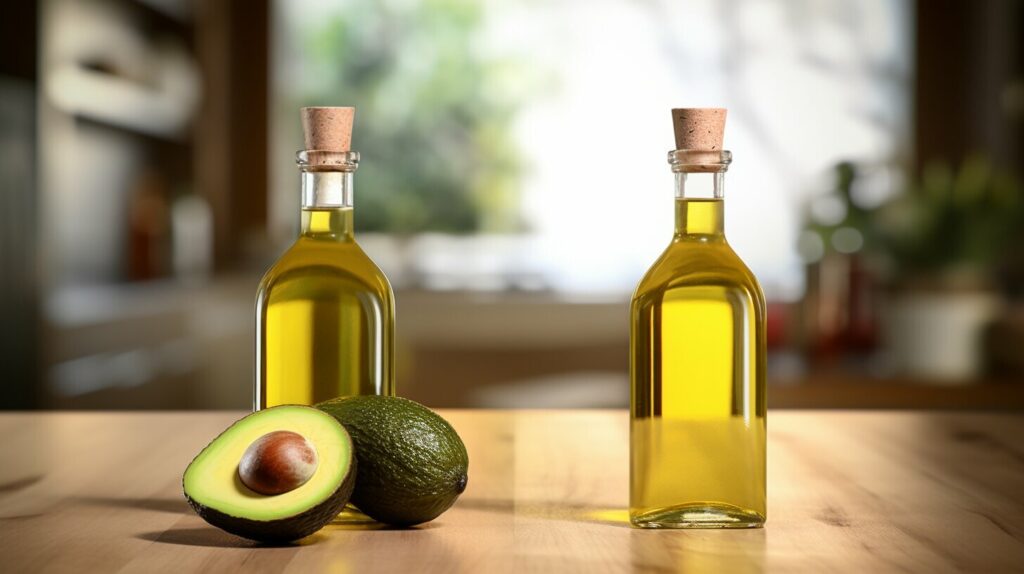
Conclusion
In conclusion, when it comes to choosing between olive oil and avocado oil, both oils have their own unique benefits and uses. Olive oil, with its slightly higher nutritional profile and versatile flavor, is a great option for enhancing the taste of various dishes, dressings, and marinades. Avocado oil, on the other hand, with its higher smoke point and neutral taste, is better suited for high-heat cooking methods like frying and searing.
From a health perspective, both olive oil and avocado oil are excellent sources of healthy fats and antioxidants. They can help improve heart health, support skin health, aid in wound healing, and promote overall wellbeing. Additionally, both oils contain lutein, an antioxidant that benefits eye health.
In the end, the choice between olive oil and avocado oil boils down to personal preference and specific cooking needs. It is recommended to have both oils in your pantry to take advantage of their individual qualities. Whether you’re looking to add flavor or need a high-heat cooking oil, olive oil and avocado oil are both valuable additions to any kitchen.
FAQ
What are the main differences between olive oil and avocado oil?
Olive oil is slightly more nutritious and has a milder flavor profile, while avocado oil has a higher smoke point and a more neutral taste.
Are olive oil and avocado oil both healthy?
Yes, both oils are considered good fats and are excellent sources of monounsaturated fatty acids, which can help improve heart health.
Which oil has more nutritional value?
Olive oil is slightly more nutritious overall, as it contains more potassium, calcium, iron, and vitamins. It also contains more vitamin E compared to avocado oil.
What are the cooking uses of olive oil and avocado oil?
Both oils can be used for sautéing, grilling, roasting, and baking. Olive oil is excellent for dressings, marinades, and dips, while avocado oil is better for high-heat cooking methods like frying and searing.
What are the health benefits of olive oil and avocado oil?
Both oils are high in unsaturated fats and antioxidants, promoting heart health and protecting against oxidative stress. They also benefit skin health, wound healing, and support brain and gut health.
How do the flavor profiles of olive oil and avocado oil differ?
Olive oil has a fresh, nutty, and pleasant taste, while avocado oil has a more grassy, mildly sweet avocado flavor.
Can olive oil and avocado oil be used interchangeably in recipes?
Yes, they can be used interchangeably in most recipes, although the taste and smoke point of each oil may affect the outcome.
Which oil should I choose?
The choice ultimately depends on personal preference and cooking needs. If you desire flavor enhancement, olive oil is a better option. If cooking at high temperatures is necessary, avocado oil is more suitable.
Are there any specific health benefits of using olive oil or avocado oil?
Both oils offer numerous health benefits, including improved heart health, skin health, and support for eye health due to their lutein content.
 Skip to main content
Skip to main content